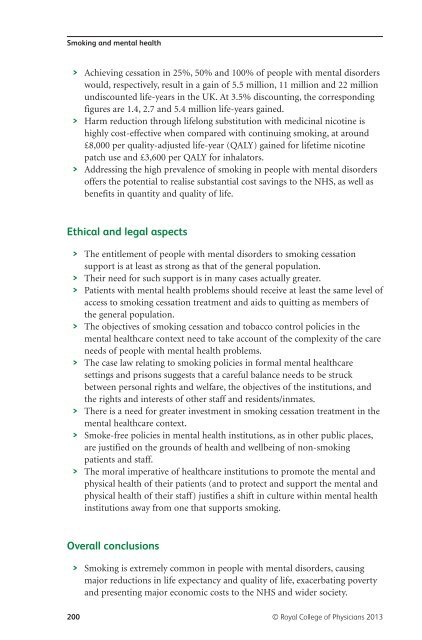Smoking and mental health - NCSCT
Smoking and mental health - NCSCT
Smoking and mental health - NCSCT
You also want an ePaper? Increase the reach of your titles
YUMPU automatically turns print PDFs into web optimized ePapers that Google loves.
<strong>Smoking</strong> <strong>and</strong> <strong>mental</strong> <strong>health</strong><br />
> Achieving cessation in 25%, 50% <strong>and</strong> 100% of people with <strong>mental</strong> disorders<br />
would, respectively, result in a gain of 5.5 million, 11 million <strong>and</strong> 22 million<br />
undiscounted life-years in the UK. At 3.5% discounting, the corresponding<br />
figures are 1.4, 2.7 <strong>and</strong> 5.4 million life-years gained.<br />
> Harm reduction through lifelong substitution with medicinal nicotine is<br />
highly cost-effective when compared with continuing smoking, at around<br />
£8,000 per quality-adjusted life-year (QALY) gained for lifetime nicotine<br />
patch use <strong>and</strong> £3,600 per QALY for inhalators.<br />
> Addressing the high prevalence of smoking in people with <strong>mental</strong> disorders<br />
offers the potential to realise substantial cost savings to the NHS, as well as<br />
benefits in quantity <strong>and</strong> quality of life.<br />
Ethical <strong>and</strong> legal aspects<br />
> The entitlement of people with <strong>mental</strong> disorders to smoking cessation<br />
support is at least as strong as that of the general population.<br />
> Their need for such support is in many cases actually greater.<br />
> Patients with <strong>mental</strong> <strong>health</strong> problems should receive at least the same level of<br />
access to smoking cessation treatment <strong>and</strong> aids to quitting as members of<br />
the general population.<br />
> The objectives of smoking cessation <strong>and</strong> tobacco control policies in the<br />
<strong>mental</strong> <strong>health</strong>care context need to take account of the complexity of the care<br />
needs of people with <strong>mental</strong> <strong>health</strong> problems.<br />
> The case law relating to smoking policies in formal <strong>mental</strong> <strong>health</strong>care<br />
settings <strong>and</strong> prisons suggests that a careful balance needs to be struck<br />
between personal rights <strong>and</strong> welfare, the objectives of the institutions, <strong>and</strong><br />
the rights <strong>and</strong> interests of other staff <strong>and</strong> residents/inmates.<br />
> There is a need for greater investment in smoking cessation treatment in the<br />
<strong>mental</strong> <strong>health</strong>care context.<br />
> Smoke-free policies in <strong>mental</strong> <strong>health</strong> institutions, as in other public places,<br />
are justified on the grounds of <strong>health</strong> <strong>and</strong> wellbeing of non-smoking<br />
patients <strong>and</strong> staff.<br />
> The moral imperative of <strong>health</strong>care institutions to promote the <strong>mental</strong> <strong>and</strong><br />
physical <strong>health</strong> of their patients (<strong>and</strong> to protect <strong>and</strong> support the <strong>mental</strong> <strong>and</strong><br />
physical <strong>health</strong> of their staff) justifies a shift in culture within <strong>mental</strong> <strong>health</strong><br />
institutions away from one that supports smoking.<br />
Overall conclusions<br />
> <strong>Smoking</strong> is extremely common in people with <strong>mental</strong> disorders, causing<br />
major reductions in life expectancy <strong>and</strong> quality of life, exacerbating poverty<br />
<strong>and</strong> presenting major economic costs to the NHS <strong>and</strong> wider society.<br />
200 © Royal College of Physicians 2013














